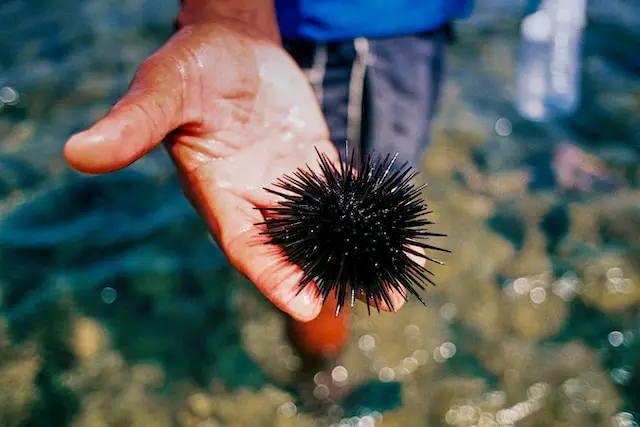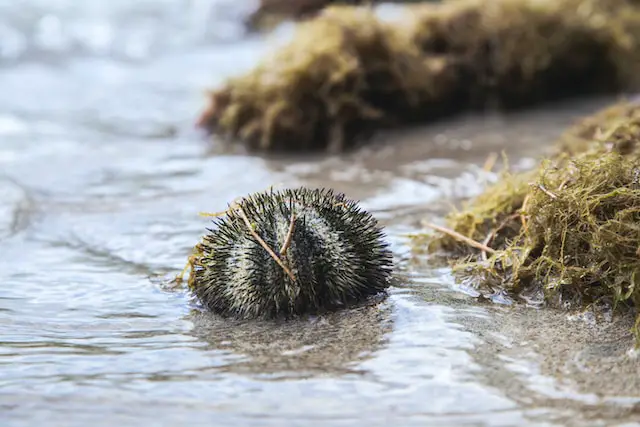Sea urchins are spiny, globe-shaped creatures that inhabit the ocean floor. They are a delicacy in many parts of the world and are considered a high-end ingredient in Japanese cuisine.
However, like any other food, eating too much sea urchin can have negative consequences on your health. In this article, we will explore what happens if you eat too much sea urchin.
Contents
Excess Of Purines
Firstly, it’s important to understand that sea urchins contain high levels of purines. Purines are natural compounds that are found in many foods, including seafood, meat, and poultry. When we consume purines, our bodies break them down into uric acid.
Uric acid is a waste product that our kidneys filter out of our blood and excrete in our urine. However, if we consume too much purine-rich food, our bodies may produce more uric acid than our kidneys can handle.
This can lead to a buildup of uric acid in our blood, which can cause a condition called hyperuricemia.
Hyperuricemia
Hyperuricemia is a condition where there is too much uric acid in the blood. This can lead to the formation of uric acid crystals in the joints, causing a painful condition called gout.

Gout typically affects the joints in the feet, ankles, and knees, but it can also affect other joints in the body. Symptoms of gout include pain, swelling, redness, and warmth in the affected joint. If left untreated, gout can cause permanent joint damage.
Allergic Reactions
In addition to gout, consuming too much sea urchin can also lead to an allergic reaction. Seafood allergies are one of the most common food allergies, and they can range from mild to severe.

Symptoms of a seafood allergy can include itching, hives, swelling of the lips, tongue, or throat, difficulty breathing, and anaphylaxis. Anaphylaxis is a severe allergic reaction that can be life-threatening if not treated immediately.
Lastly, it’s important to note that sea urchins can also contain high levels of heavy metals such as mercury. Mercury is a toxic substance that can accumulate in the body over time, leading to health problems such as kidney damage, nerve damage, and cognitive problems.
Health Benefits
Sea urchin is not just a delicious delicacy, but it is also a nutrient-dense food that offers several health benefits. Here are some of the health benefits of consuming sea urchin:
- Rich in nutrients: Sea urchin is an excellent source of nutrients, including protein, omega-3 fatty acids, vitamins B12 and D, calcium, and iodine. These nutrients play a vital role in maintaining healthy bones, muscles, and the immune system.
- Boosts brain function: Sea urchin is rich in omega-3 fatty acids, which are essential for optimal brain function. Consuming sea urchin can help improve cognitive function, memory, and focus.
- Promotes healthy skin: Sea urchin contains antioxidants that protect the skin from damage caused by free radicals. These antioxidants also help prevent premature aging, reduce inflammation, and promote healthy skin.
- Supports cardiovascular health: The omega-3 fatty acids found in sea urchin can help reduce inflammation, lower blood pressure, and improve cholesterol levels. These factors can help reduce the risk of cardiovascular disease and stroke.
- Supports thyroid function: Sea urchin is a rich source of iodine, a mineral that is essential for healthy thyroid function. The thyroid gland produces hormones that regulate metabolism, energy production, and growth and development. Consuming sea urchin can help maintain healthy thyroid function.
- Enhances immune system function: The nutrients found in sea urchin, such as vitamin D and selenium, can help boost the immune system. Vitamin D helps regulate immune system function, while selenium is essential for the production of antibodies.
Consuming sea urchin in moderation can offer several health benefits, including promoting brain function, healthy skin, cardiovascular health, thyroid function, and immune system function. So, if you enjoy the taste of sea urchin, it’s a healthy addition to your diet.
Helps In Weight Loss
While sea urchin is a nutrient-dense food that can offer several health benefits, it is not necessarily a food that directly promotes weight loss.
Sea urchin is low in calories and high in protein, which can help you feel full and satisfied, leading to a decrease in overall calorie intake.
However, the amount of sea urchin you would need to consume to make a significant impact on weight loss would likely be impractical and potentially harmful due to its high purine content.

If you’re looking to lose weight, the best approach is to follow a balanced diet that includes a variety of nutrient-dense foods, along with regular exercise.
A balanced diet should consist of lean protein, complex carbohydrates, healthy fats, and plenty of fruits and vegetables. Additionally, it’s important to limit your intake of processed foods, added sugars, and unhealthy fats.
Nutritional Information
Sea urchin is a nutrient-dense food that contains a variety of essential vitamins, minerals, and macronutrients. Here is a breakdown of some of the nutritional content of sea urchin per 100 grams:
- Calories: 131 kcal
- Protein: 16.4 g
- Fat: 4.9 g
- Carbohydrates: 4.4 g
- Fiber: 0 g
- Sugar: 0 g
- Calcium: 77 mg
- Vitamin A: 26 IU
- Vitamin B1 (Thiamin): 0.1 mg
- Vitamin B2 (Riboflavin): 0.2 mg
- Vitamin B3 (Niacin): 1.5 mg
- Vitamin B5 (Pantothenic acid): 0.3 mg
- Vitamin B6 (Pyridoxine): 0.1 mg
- Vitamin B12 (Cobalamin): 15.6 mcg
- Vitamin C: 2.2 mg
- Vitamin D: 480 IU
- Vitamin E: 0.2 mg
- Vitamin K: 0.1 mcg
Sea urchin is also a good source of omega-3 fatty acids, with approximately 0.2 grams per 100 grams of sea urchin. Overall, sea urchin is a nutrient-dense food that provides a wide range of essential vitamins, minerals, and macronutrients.
Conclusion
Sea urchin is a nutritious and delicious food that is enjoyed by many around the world. It is a low-calorie food that is high in protein, vitamins, minerals, and omega-3 fatty acids.
Consuming sea urchin in moderation can offer several health benefits, including promoting brain function, healthy skin, cardiovascular health, thyroid function, and immune system function.
Additionally, consuming too much sea urchin can lead to mercury toxicity, so it’s important to consume it in moderation and source it from reputable suppliers.
